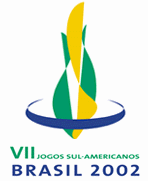
The VII South American Games were a multi-sport event held in 2002 in Rio de Janeiro, Rio de Janeiro; São Paulo, São Paulo; Curitiba, Paraná; and Belém, Pará; all in Brazil. The Games were organized by the South American Sports Organization (ODESUR). An appraisal of the games and detailed medal lists were published elsewhere, emphasizing the results of the Argentinian teams.
The IAAF World Half Marathon Championships is an annual half marathon competition organised by the International Association of Athletics Federations. It was contested from 1992 to 2005, and replaced by the IAAF World Road Running Championships, a 20 kilometres race which had its inaugural event held in 2006 in Debrecen, Hungary. After a second edition of the Road Running Championships, which was over the half marathon distance, it reverted to the original name of the World Half Marathon Championships.

Natália Falavigna da Silva is a taekwondo athlete from Brazil. She finished in the fourth place in the women's 67-kilogram category in taekwondo at the 2004 Summer Olympics on August 26, and won the bronze medal at the 2008 Summer Olympics. It was the first Brazilian Olympic medal ever in taekwondo.

The Flamengo Basketball team is a professional basketball team that is located in Rio de Janeiro, Brazil. It is a part of the Clube de Regatas do Flamengo multi-sports club family. The club's full name is Basquetebol do Clube de Regatas do Flamengo. The club's commonly used short names are C.R.F. Basquete, C.R. Flamengo Basquete, Flamengo Basquete, and FlaBasquete.
The South American Junior Championships in Athletics are the South American championships in the sport of athletics which is open for those in the junior age category. It is organized by the South American Athletics Confederation (CONSUDATLE).
Unofficial South American Championships in Athletics were held in Santiago, Chile in 1957. The athletics meeting was for men only.
The eighth South American Junior Championships in Athletics were held in Cali, Colombia, at the Estadio Olímpico Pascual Guerrero between October 9–12, 1970.
The 14th South American Junior Championships in Athletics were held in Rio de Janeiro, Brazil from October 15–18, 1981.
The 32nd South American Junior Championships in Athletics were held in São Leopoldo, Brazil at the University of Unisinos Track club from October 7–8, 2000. Athletes from Portugal were invited to participate as guests.
The 34th South American Junior Championships in Athletics were held at the Estádio Olímpico do Pará in Belém, Brazil from August 1–3, 2002 in conjunction with the 7th South American (ODESUR) Games. Athletes from the Netherlands Antilles competed solely for the South American Games, and were considered as guests for the South American Junior Championships.
The 4th South American Youth Championships in Athletics were held in Rio de Janeiro, Brazil from July 22–24, 1977.
The 37th South American Junior Championships in Athletics were held at the Estádio Ícaro de Castro Melo in São Paulo, Brazil from June 30-July 1, 2007. The Champions for men’s 10,000m, both Race Walking and Combined Events were extracted from the classification of the 2007 Pan American Junior Athletics Championships held at the same site one week later from July 6 to July 8, 2007. A detailed report on the results was given. Best performances were the two South American Junior records by Alonso Edward from Panamá in 10.28s in the men's 100m competition, and Jorge McFarlane from Perú who achieved 13.76s (0.0 m/s) in the first heat in 110m hurdles men.

The 38th South American Junior Championships in Athletics were held in São Paulo, Brazil in the Estádio Ícaro de Castro Melo from July 25–26, 2009. The Champions for men’s 10,000m, both Race Walking and Combined Events were extracted from the classification of the 2009 Pan American Junior Championships held in Port of Spain, Trinidad and Tobago in the Hasely Crawford Stadium from July 31 to August 2, 2009. A detailed report on the results was given.

The 2007 South American Cross Country Championships took place on February 25, 2007. The races were held at the Centro de Treinamento da Marinha in Rio de Janeiro, Brazil. A detailed report of the event was given for the IAAF.
The 2001 South American Cross Country Championships took place on March 3–4, 2001. The races were held in Rio de Janeiro, Brazil.

Events in the year 2011 in Brazil.
Jorge Henrique da Costa Vides is a Brazilian track and field sprinter who competes in the 100 metres and 200 metres. He represented his country at the 2016 Summer Olympics. He holds a 200 m personal best of 20.38 seconds.

The Troféu Brasil de Atletismo is an annual track and field meeting which serves as Brazil's national championships for the sport for athletics clubs. The Brazilian Athletics Confederation has not explicitly designated an annual national championships, thus this also serves as the de facto senior athletics championships. It has also been used to determine the track and field team for Brazil at the Olympics.










